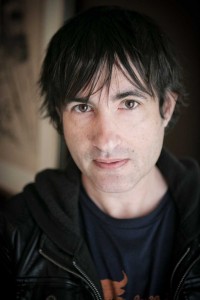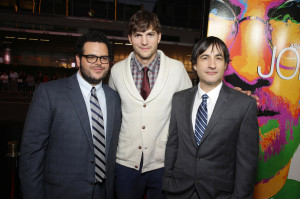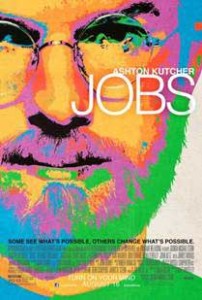
When Martyn Burke made the TNT film Pirates of Silicon Valley in 1999, focusing on the relationship between Microsoft founder and lead proponent Bill Gates (played by Anthony Michael Hall) and Apple founder and dominant figure Steve Jobs (played by Noah Wyle), Jobs had at that point just returned to Apple after a 12-year hiatus, driving the company into a period of unprecedented innovation and profitability.
Now, Joshua Michael Stern is presenting a new version of the story, or at least 50 percent of the tale of accidental billionaires who started fledgling companies in parental garages and collegiate dorm rooms, only to later change the world. With Jobs, Stern comes to the iconic American story of start-up capitalism, megalomania, greed, arrogance and an unwavering commitment to one’s personal vision. This time, the story comes after the noteworthy passing of the titular character, thus with the benefit of the general populace’s more rampant familiarity with the tale, which could be seen as both a blessing and a curse.
Both Pirates and Jobs cover some similar territory in the early years of their characters, though Jobs includes Jobs’ returning years to Apple in 1997 and includes material up to the 2001 debut of the iPod. In making Jobs, the director approached the material with a fresh perspective. “I really wasn’t that aware of the history, which was why it was such a revelation to me when I came to it,” he said. “I was aware of the Steve Jobs who gave those keynote speeches selling technology. The script exposed what was basically an origins story. That was revelatory.”

Where Pirates had Jobs and Gates as main characters with peripheral characters such as Steve Ballmer and Paul Allen, co-founders of Microsoft, and Steve “Woz” Wozniak, co-founder of Apple, Stern’s film largely focuses solely on Jobs, with Wozniak as a secondary character supporting scenes in the early years. Stern knew what he could manifest as his strongest suit in making this film, and that was the legendary figure of Jobs himself. “What Steve did and did best was recognize what would be culturally cool and when asked about it, he used the word obvious,” said Stern. “Time and time again, there was no question to him, he was so single-minded, it was like having a religious epiphany. He was focused, and, in many regards, he was surrounded by these misfit band of guys but not partaking in free love. They were stuck in their garages fiddling with hobby kits.”
Shooting the scenes where Apple formed to create the first personal computer in 1976 were completed in Jobs’ actual house in Silicon Valley and in the actual garage where the work took place with Wozniak. “This wasn’t just any garage where a bunch of guys tinkered with an invention,” Stern noted about the historic time and place.
Of course, a major element of any telling of the Apple or Microsoft story is the degree to which its driving forces were not only ego-maniacal, but were also perhaps antisocial and could be downright cruel. In Stern’s film, many crucial scenes focus on Jobs’ reaction to his chosen co-workers test of loyalty to the man who named the company after a memorable summer where he picked apples in Oregon. “What’s really hard is that you have to convey a lot with a look or a moment,” said Stern of directing these pivotal scenes which are often conveyed by relatively small pieces of a performance. “You are looking for those moments that are really symbolic of bigger swaths of life. At a certain point, Steve got disconnected with where he started because he’s so forward-thinking. If you are only looking towards what’s next, there are people that you leave behind. He came to believe that.”
Certainly, the measure of what Jobs accomplished in his short life must also be judged against his first 20 years, which were filled with a drug-taking, anti-authoritarian behavior, and a notably counter-cultural hippie lifestyle in the late 1960s and early 1970s. “I do think the beginning of his life when he was a hippie, he would tell high school students, ‘I think you should go fall in love with more than one person at once, travel the world,’” said Stern. “The beginning part of his life was remarkably unfocused. It wasn’t a foregone conclusion that he would be an engineer or in technology. He just wanted to do something amazing. He thought Woz created something that was it [the first prototype personal computer in 1976]. I don’t think a day before that moment, he had any idea he would be in technology.”
In concert with Ashton Kutcher, Stern delivers a Steve Jobs who is equal parts visionary, tyrant and leader, and the two craftsmen worked diligently to do so in Jobs. “Only recently did I remember how obsessive we were over every detail of every scene,” said Stern. One such moment is when Jobs first sees Woz’s personal computer laying humbly on a desk, looking unlike anything which came before it in the tech world. “It starts with Woz; he was tinkering with so many things, it was really about Steve pushing this thought forward,” said Stern. “We needed to symbolize the moment.” A similar character revelation in a like-minded film could be when Sean Parker (played by Justin Timberlake) first views the early Facebook interface in a Stanford dorm room in David Fincher‘s The Social Network.
After having seen the disassembled first personal computer in Wozniak’s house, nothing was ever the same for Jobs. He obsessively and decisively spent a year on the phone trying to get someone, anyone to listen to his claims about the potential of the machine. Eventually, they took the prototype to a Homebew Computer Club meeting in Palo Alto, to reveal it to that informal group of tech hobbyists. “After talking to Woz at the first Homebrew meeting, he goes to the house and his girlfriend is smoking a joint with his friend, and we realize that something has changed,” Stern said about his main character. “Everything that happened before that moment would have to be let go. That starts him in a slow spiral to becoming that single-minded obsessiveness.”
In making the film, Stern confessed that, at some point, he needed to approach the material of Jobs as being about something bigger than one man’s story. “For me. as a director, I had to step aside, away from the story of Steve Jobs and had to figure out what moments exist in all good dramas of geniuses or kings,” Stern said. “He was a young hippie in a world of IBM guys.”
In one memorable scene, in which loyalty and betrayal hang in the balance among Jobs’ peers, Apple’s board votes on whether or not to retain Jobs, just after his 30th birthday. “It was a moment where the one person who believed in him and could have saved him was the man who ultimately decided on removing the company from him,” said Stern. “It was a story about a man who creates a company, but, at one point, the company becomes him and he becomes the company.”
In that pivotal scene, Jobs looks towards the man who initially funded Apple with venture capital, Mike Markkula (played by Dermot Mulroney). When Markkula votes against Jobs, Kutcher manifests a look which Stern described as “you are literally killing me. This news is physically a blow as much as an emotional blow. ‘You should look at him almost with a smile which should say, I know why you had to do this, but you’re breaking my heart. I know why you’re doing it, but you’re killing me, but I forgive you.’ Ashton delivered it beautifully. ”
 When asked where he came up with the idea for such a classic movie moment, Stern unearthed his past as a cinema fan. “When I was very young, I saw a Robert Altman movie, McCabe and Mrs. Miller,” he stated. “Altman would be on a scene, then zoom into a secondary character just to get that character’s reaction. In Jobs, there’s a scene where Jobs brings in John Sculley, and he thinks that if he gets a friend who is a corporate guy, [that will help both him and Apple, but] Woz goes back to his video game. Just a small nuance, especially in a biopic.”
When asked where he came up with the idea for such a classic movie moment, Stern unearthed his past as a cinema fan. “When I was very young, I saw a Robert Altman movie, McCabe and Mrs. Miller,” he stated. “Altman would be on a scene, then zoom into a secondary character just to get that character’s reaction. In Jobs, there’s a scene where Jobs brings in John Sculley, and he thinks that if he gets a friend who is a corporate guy, [that will help both him and Apple, but] Woz goes back to his video game. Just a small nuance, especially in a biopic.”
Surely, there was a definite backstabbing to get Jobs out of Apple in 1985. He was banished from his own company for more than 10 years following the ouster before he came back to Apple and leveled the place so that he could take over again. Lest anyone feel sorry for Jobs, during that period, he started another computer company called NeXT that was later sold to, of all companies, Apple, and, during this time, he also bought George Lucas‘s struggling computer animation division which became Pixar Animation Studios.
Now that Jobs has passed, many prominent tributes in print and electronic media precede Jobs, but Stern is confident of his film’s accuracy. “I think [Steve Jobs] would say that of what is known to the public and what is out there about him, we got it right,” said Stern. “I think he’d feel that we got the spirit of the obsessive fevered run to creating something great and what it took – the spirit of the origins of how he came to what he needed to get to. Though, I obviously think he’d also say that we got X, Y and Z wrong, especially in the private moments. Most people around him for 30 years didn’t even know if he had kids. For me to venture in the story besides Apple would be pure conjecture. You want to take a lot of fictional turns to create a fluidity in the storytelling. In many regards, I was chained to what was known. That which we covered, I think we got right.”
Without question, Jobs shows both Stern and Kutcher in its leading performance, and Stern realized the importance of the combined effort. “It was a true collaboration, and I say that with total transparency,” he said. “I walked into this character feeling daunted by the fact that whoever played him would have to be obsessed with playing him. When I walked into the first meeting with Ashton, he was already Steve Jobs for me. I had evidence that he could play the role. There was a commitment to play the role – he went on Steve’s diet to play the role.”
In the early scenes, there is scant evidence of the Jobs to come, and the director and star knew that they had to slowly draw out the character who became a worldwide legend. “He wasn’t a historical character. He was young Steve Jobs,” said Stern. “He was a normal guy from the valley. We talked about everything and tried to make it better and better. We pretty much had a nightly 1 a.m. conversation about the next day’s work to make it something more truthful than what was written. We had very few disagreements on the role. He really needed to trust me, and we had a lot of meetings. The reality is that I had to have a bigger sense of what the arc of the character was.”
With Jobs set to debut on Aug. 16, Stern has high expectations for the audience gravitating to this renowned story once again. “There two things that I would love people to take away,” he said. “I would love people to understand the Steve Jobs that they remember when he was young. He was frustrated and misunderstood. He had to be fearless to achieve what he achieved. He was imperfect and we can all relate to that – on the outside of what is cool. At the end of the film, in the voice-over, Jobs says that when you wake up and realize that the world was created by people no smarter than you, your world will change. The new world economy is going to be focused on the individual and self-motivator. That creation in their garage that can make our lives easier. The entrepreneur-ism of the next century will define that century. Hopefully in 30-40-50 years, there will be hundreds of Steve Jobs.”





